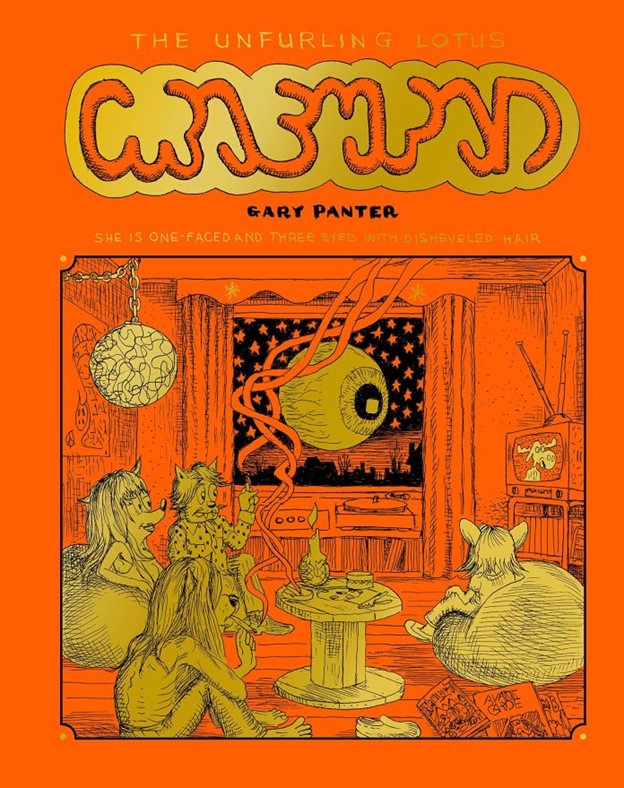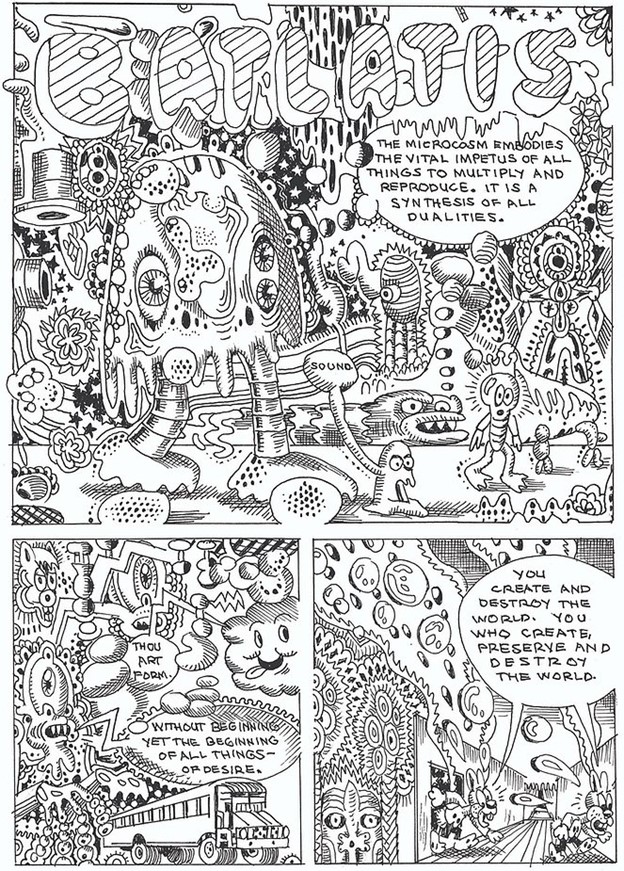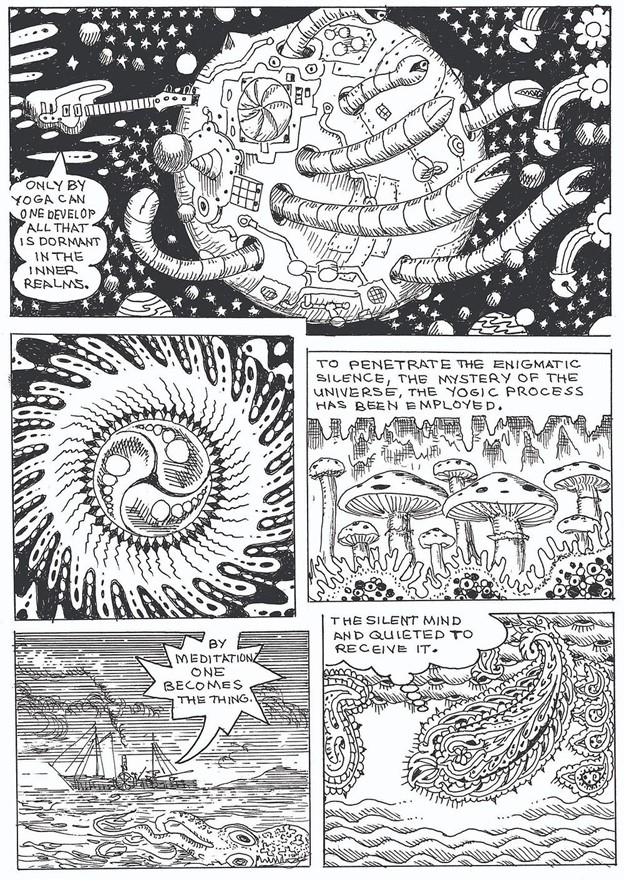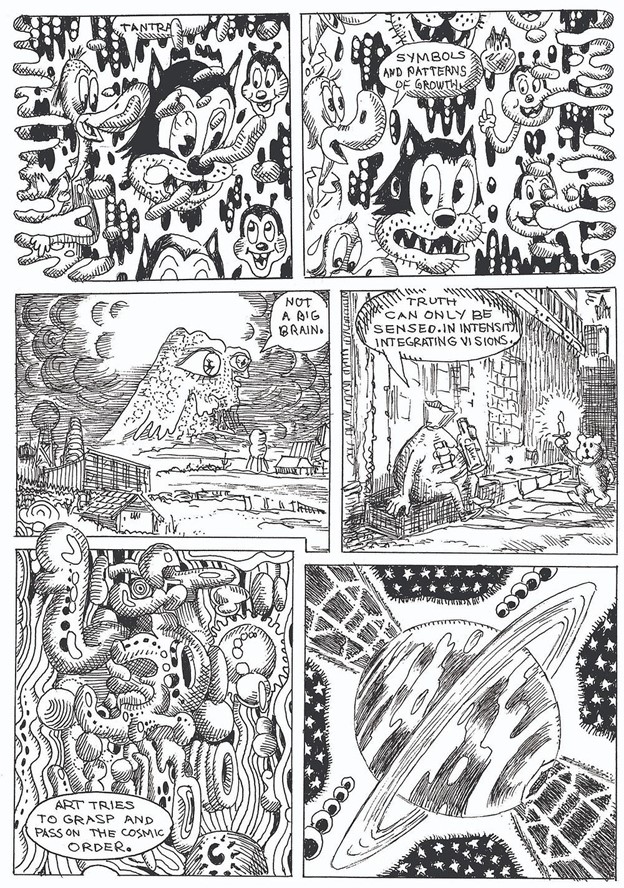
For so many of us, for so long, Gary Panter has always represented both the cutting edge and the signpost leading forward simultaneously. Here, after all, was someone who so fluently combined, yet resisted outright “borrowing from,” aesthetic schools and traditions ranging from the avant-garde to the mainstream that his work stood on its own as something well and truly peerless, incomparable — as succeeding generations of cartoonists found themselves at best inspired by, at worst beholden to, his oeuvre, the size and scope of his influence became ever more clear: there were any number of artists who produced work like Panter’s, but Panter’s work steadfastly remained unlike anyone else’s.
It may, then, come as a bit of a shock that the latest project to emerge from the mind and hand of comics’ resident senior statesperson of singularity should be, at least on the surface, an exercise in nostalgia. Yet, upon first glance, that’s precisely what Crashpad (Fantagraphics, 2021) bears all the hallmarks of — a love letter to the hippie-dippie underground comix of yesteryear that openly, even gleefully, pays homage to their ethos in its entirety. A tip of the hat to Crumb, Moscoso, Griffith, Shelton, Mavrides, Sheridan, et.al. by a long-time admirer who feels a public “thank-you” is in order.
Errrr — not so fast there, cowboy. Have you forgotten who we’re talking about here?

As any seasoned Panter reader can tell you, trusting in appearances — even when those appearances are wildly, mind-meltingly alluring — is always a mistake when it comes to fully grasping one of his projects, and Crashpad is certainly no exception. For one thing, the questionable sexual politics, even outright misogyny, that so much of the underground was sadly replete with is mercifully dispensed with here, as is the predictable tendency for a story to start things off in rather prosaic fashion before spiraling/elevating into “trippy” states of altered consciousness. In the first of many flips of the script, Panter actually begins this revisionist underground with the “cosmic awareness” stuff, then proceeds to bring it all back down to Earth, and, later, still melds the two modes of being for his denouement — before concluding with something that, I’d dare say in a pinch, eschews stereotypical catharsis in favor of something far less melodramatic but altogether more satisfying, perhaps even more transformative, by dint of its conceptual honesty. It’s a far-out trip in every respect, to be sure, but it’s one that utterly defies preconception in that it gets even more wild when our ensemble of hippie anthropomorphic cats come down from their first high and start pursuing their next one — and once they achieve that, the delicious contradictions continue apace when the narrative begins to make more intuitive “sense” the more their ability to speak (or at least to speak coherently) breaks down.
For my own part, if I’m going to chain myself within the conservative confines of the linguistic realm — as, let’s face it, I’m obligated to do when writing a review — the word that I would be looking for above all here is holistic. Every Panter comic is a self-contained and thoroughly immersive world — even his books and strips that are part of larger and longer over-arching or multi-volume series — and while the multiple layers of thought and even, perhaps, of existence on offer here put that trademark hermetic sealing to the test, Panter’s clarity of purpose and vision never wavers, even when the “reality” (or vague approximation thereof) his characters are experiencing does.

Every bit as interesting to me, though, as events unfolding on the page (or should that be pages? After all, when you buy this thing you’re getting one comic in two formats, the first being the oversized and embossed slim hardcover typical of Panter’s recent-vintage projects, the other being a standard-format comic book tucked inside an envelope fastened to the inside front cover — another stylistic nod, of course, the underground) are the ideas and feelings that both inform and are channeled by them. For instance, as already mentioned, some of the more dubious aspects of hippie-era cartooning are artfully dodged here, while the fun stuff — the psychedelia, the humor, the starry-eyed idealism — are not only present and accounted for, they’re often amped up to the proverbial Nth degree, which makes perfect sense given that Panter missed out on being part of the underground himself by a good few years but no doubt was exposed to much of its wares, and its influences, during his formative years. And yet, refreshingly, when push comes to shove, he’s more than willing to toss off the rose-tinted glasses of nostalgia and honest enough to admit, in plain language no less, that what began as a flower-child utopian dream devolved into “a dancing bear.” Remember, after all, that a lot of former hippies ended up getting crew cuts, going to work on Wall Street, and voting for Reagan. Those who didn’t often settled for a codified and commercialized version of what used to be a set of actual ideals.

Fortunately, though, there’s a hell of a lot more to be gleaned from this comic than merely cynical end-of-the-day resignation — that’s a stop on the road to Panter’s destination, to be sure, but so is the romantically idealized vision of the underground that informs so much of what’s going on herein. Besides, the phantasmagoric ride — replete as it is with deliriously imaginative visual wonders rendered with just plain enviable skill — is every bit as important as its endpoint, right? And yes, so often that sentiment, while technically true, is utilized in service of mitigating the effects, both immediate and lingering, of an unsatisfying conclusion. Rest assured, though, that such is hardly the case here.
Where, then, is Crashpad taking us? Why, to the one place Gary Panter has always gone, probably the only place he even knows how to go to, and somewhere that’s utterly and inarguably different and unique each time — a place entirely of his own invention and conceptualization.
SOLRAD is made possible by the generous donations of readers like you. Support our Patreon campaign, or make a tax-deductible donation to our publisher, Fieldmouse Press, today.

Leave a Reply